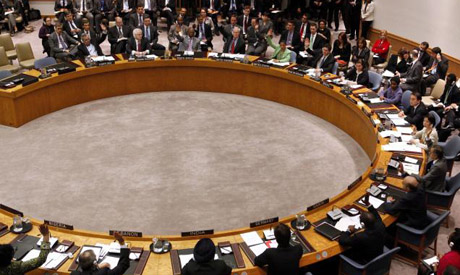
Member states vote to approve a resolution to impose a no-fly zone over Libya during a meeting of the United Nations Security Council at U.N. headquarters on Thursday (Photo: AP)
Japanese shares jumped nearly 3 per cent and the yen tumbled on Friday after the Group of Seven agreed on joint intervention to curb the soaring currency and calm markets jittery over Japan's nuclear power plant crisis.
European stocks looked set to join in the rally, with the FTSEurofirst 300 .FTEU3 rising half a per cent at the open. Traders were also citing initial intervention in the euro to bolster the yen.
Brent crude oil jumped by $2 to close to $117 a barrel fears of rising geopolitical tension in the oil-rich Middle East and North Africa, after the United Nations approved military action to contain Libyan leader Muammar Gaddafi.
The move by the G7 to support Japan as it struggles to cope with its biggest crisis since World War Two comes a day after the yen soared to a record 76.25 in chaotic trading.
The dollar rose more than 3 per cent to around 81.75 yen after the G7 announcement, which came just as the Tokyo stock market opened.
"It was as clear as it could be and it was huge," said Imre Speizer, a senior strategist at Westpac Bank in Wellington. "They said they will intervene and the whole world will intervene. This is much bigger than earlier expected."
Stocks were generally buoyant, particularly in emerging markets.
Japan's Nikkei share average .N225 rose 2.7 per cent, but still closed down around 10 per cent on the week, which wiped $350 billion off the stock market.
"The main things investors are worried about now are the nuclear plant, the impact of the earthquake and tsunami on firms and power cuts putting pressure on Japanese manufacturers," said Norihiro Fujito, senior investment strategist at Mitsubishi UFJ Morgan Stanley Securities in Tokyo.
The yen's surge had initially been prompted by expectations insurance companies and other firms would repatriate funds to meet the massive reconstruction costs of the disaster.
Then a wave of stop-losses and options-related selling kicked in, propelling the yen past its previous record of 79.75 per dollar that occurred in the wake of the 1995 Kobe earthquake.
Japan's strongest earthquake on record a week ago raised concerns of reduced demand from the world's third-largest oil user and triggered a drop in Brent to a three-week low near $107 two days ago.
"The initial shock in the markets with regards to the negative impact on growth as well as the short-term effect on Japanese demand is now subsiding and people are turning to the medium- and long-term implications of the earthquake on oil demand and turmoil intensifying in the Middle East," said Yingxi Yu, a Singapore-based commodities analyst with Barclays Capital.
The involvement of foreign forces in Libya "could prove to be a further escalation of the situation in Libya. It seems difficult that this will speed up the flow of Libyan oil back into the world market," Yu added.
Short link: